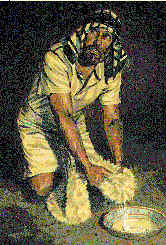 Fabulous story from The Sacred Sandwich (you should click the link for the full text of this brief, well-told story) —
Fabulous story from The Sacred Sandwich (you should click the link for the full text of this brief, well-told story) —
The White Flag Man was a fellow by the name of Peter “Petey” Hopkins who every morning at sunrise would go out and hoist up a white flag on a flagpole in his front yard and then take it down at sunset. He started doing it around fifty years ago, not long after his wife and three-year old daughter died in a tragic car accident, and as far as anyone could tell, he never missed a day. At least not until last week. …
But Petey Hopkins had made a point every morning when he awoke that he would surrender himself to Jesus Christ. …
Perhaps it was a cheesy ritual in an outward sense, but for Petey the act of running up a white flag was a gesture that created the perfect impetus for the day. It fixed Jesus in his mind as soon as he left his bed and became the catalyst for his actions and thoughts throughout each waking moment. …
Among the many heartwarming accounts: On the hottest days of the year, Petey was often seen toting jugs of cool spring water to the parched farmers working in the fields; he personally brought a box of groceries to Marge Whittle every week for three months until she found another job; he saved the Hobson boy from drowning in McGonigle’s pond and in the process almost drowned himself; he volunteered his time and tools to help Harvey Cline rebuild his mule barn after a fire; he prayed many times with Jim and Pam Snelling when Pam got terminal cancer and would often drive her to chemotherapy when Jim was at work; and more significantly, he talked about Jesus Christ to Pat Toomey, Ray Bob Smith, Bonnie Sharp, Lori Henderson, Jack Lutcher, Cliff and Janelle McElwee, Thelma Butterworth, Wilson Pratt… well, you get the picture.
This reminds me of a similar story told by Ray Vander Laan.
During Roman times, a Jewish rabbi approached a Roman army camp. As he came near, a soldier step in front of him and barked, “Who are you? Why are you here?”
The rabbi responded, “How much do they pay you to ask such questions?”
The soldier, startled by unconventional response, answered, “One denarius a day.”
The rabbi said, “I’ll pay you twice that if you’ll stand outside my house and ask me those questions every time I leave or enter!”
Questions: Does any one here have a daily ritual to remind you to surrender to Jesus? If so, what has been the impact on your life? Can you relate similar stories about others you know?

 We’re all familiar with the story of Gideon, who twice laid out fleece as a means of confirming God’s will. It’s in Judges.
We’re all familiar with the story of Gideon, who twice laid out fleece as a means of confirming God’s will. It’s in Judges. I’ve written entire series here regarding being a “missional” Christian or church, but it’s been a long time. So I guess I shouldn’t have been surprised that many readers are unfamiliar with the term. A few even concluded that I must have coined the term. Now, I’m not above making up a word when it suits purposes, but I can’t take credit for this one.
I’ve written entire series here regarding being a “missional” Christian or church, but it’s been a long time. So I guess I shouldn’t have been surprised that many readers are unfamiliar with the term. A few even concluded that I must have coined the term. Now, I’m not above making up a word when it suits purposes, but I can’t take credit for this one.

